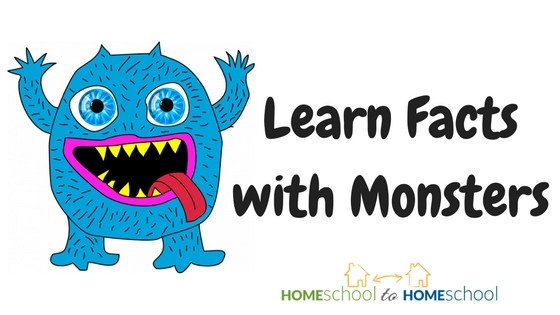- You are here:
- Home »
- Blog

You’re Doing Better Than You Think You Are
Hey you!
You’re doing better than you think you are.
On any given day, you are trying your best to give your kids a good education.
Now — what YOU think is your best — and what you are actually able to give — may not be the same thing!
You may think your best is perfect science experiments and perfect handwriting and everyone getting all their chores and no fighting and everyone singing happily throughout the day.
When in reality your best today may be just getting dressed and putting cold cereal on the table and turning on Daniel Tiger because it’s “educational.”
If you got up and you tried today, that WAS your best.
Do you want your best to be a little better tomorrow? Sure you do.
Do you want this level of “best” to stay this way? Of course not!
Redefine “best” as “I’m trying.” And tomorrow you get up and try again. Because you really are doing better than you think you are!

Learn Facts with Monsters
You may not know this, but over the years, my home has been overrun by monsters.
I don’t know why so many of the games I have made up over the years seem to have monsters in them, but the kids always loved them!
A great example of how we used monsters is called Alphabet Monster.
This game started when my oldest was just two years old, and I started trying to teach her to read.
(That means that Alphabet Monster is older than my decision to homeschool–wow!)
Over the years, I played it with all of my kids . . . although it went through a few variations.
It’s a great game when you’re just teaching the sounds that go with each letter. I played it with just one kid or with all four of my kids at the same time. And it’s fabulous for the kid who just can’t seem to sit still.
How you prep:
- Write the alphabet lowercase letters on 3×5 cards.
- You’ll want up to six of each letter, depending on whether you’re learning or reviewing.
- Use a dark marker like a Sharpie.
- This is a great “sit in front of the tv and zone out” activity.
- Find a monster graphic online that you like (google “monster image”).
- Print out six that you can glue to the 3×5 cards.
- Color is best but not required.
How you play:
- When it comes time to play, choose which letter sounds you want to review or learn. Pick the appropriate cards from your stash of letter cards.
- Shuffle the letter cards, and then insert the Alphabet Monster cards into the deck so that they are reasonably spaced.
- Sit on the floor with the deck of cards turned face down in the middle.
- Each person takes a turn turning over a card from the deck. If it’s a letter, everyone makes the appropriate sound. If it’s a monster . . .
- . . . something crazy happens. This is where the game has changed over the years.
When it was just my two year old and me, we would chase each other around the house.
Once there were several young kids playing, the kid who picked the monster would try to catch the others before they could race around the house and back to their spot. (I would sit and watch.)
Once they got older (and more competitive and rougher!), they all just did crazy monster moves while they ran around the house one time.
When I was back to playing with one kid, I was tired so I would just tackle my youngest kid and do a monster tickle.
This game works with ANY facts that you wanted to review–as long as your monster cards were the same size as your fact cards.
Oh, the joy of monsters!
Your turn … Comment below and tell me what facts your kids would love to review with monsters!

Turning “I can’t!” into “I CAN!”
I once asked my six year old to pick up some food that had fallen on the floor during dinner time.
I knew she would be squeamish—it was peas and mashed potatoes, after all—so I offered her a paper towel to protect her fingers from slimy cold food and lots of encouraging words.
 She still collapsed in a heap on the floor, and as tears began to stream down her face, she sobbed, “I can’t! I can’t!”
She still collapsed in a heap on the floor, and as tears began to stream down her face, she sobbed, “I can’t! I can’t!”
“Really?” I wanted to say. “You can’t bend down and pick up a few pieces of food off the floor? What, are your arms broken?”
Fortunately, my “time to be a good parent” sensor went off. (It happens sometimes!)
I remained calm and let her spend the next forty-five minutes working through her issues with wet food.
So why do kids say “I can’t” when you know that they can?
You know they can because you saw them do it yesterday … or they did something much harder last week … or you saw their sibling who is six years younger do it earlier that same day.
I believe sometimes my kids know that they can, too, and they say “I can’t” just to avoid doing something unpleasant.
But I also believe that there are many times when my kids don’t believe that they can because they don’t feel competent.
Emotional Competence
Competence is one of the basic human needs. It means that you feel like you can accomplish something, or that you can be successful at what you attempt.
But competence is much more than just what you are capable of physically. In order to feel motivated to do something, you also have to feel emotionally competent.
Being a kid is hard. And being a kid is harder for some kids than it is for others.
What “Can’t” Sometimes Means
 I have one son who struggles to complete simple tasks–such as brushing his teeth–if he is tired or hungry or receiving too many instructions at once.
I have one son who struggles to complete simple tasks–such as brushing his teeth–if he is tired or hungry or receiving too many instructions at once.
He will start to cry, get angry, and yell that “he can’t do it.”
Now I know that he can physically brush his teeth. He does it all the time.
But in the moment, emotional or mental or unrelated physical issues cloud his ability and remove his competence.
One of my daughters has spent years learning to play the violin. Again and again, when she hit something new and difficult, her initial reaction was to throw herself into her chair and proclaim, “I can’t do it!”
This usually happened after she had tried and failed to be perfect the first time.
It took years to learn for both of us to learn that “I can’t” almost always meant she was one or two tries away from getting it right. But in the moment, she really did feel like it was hopeless.
She didn’t feel competent and didn’t want to keep going—even if she was only moments away from success.
Every Kid Is Different
Some kids come to this Earth naturally feeling more competent than others. They trust themselves and are willing to give new things a try. They aren’t easily overwhelmed. They problem solve new situations, seeing them as an exciting challenge.
Other kids struggle breaking tasks down into manageable steps—they get easily overwhelmed. They look at something new with a lot of fear and trepidation. They don’t like to take risks—and they don’t want to fail.
These kids require a lot of additional patience and love.
They need us, as parents, to help them feel like they can be competent. We have to provide a safe environment for them to practice failing so that they can succeed.
We have to help them break down tasks and walk them through those tasks step by step. We have to be calm and collected as they work through intense emotions that come with not feeling capable and competent at a job that they have to do.
Step Back and Ask
Do you have someone who says “I can’t” a lot? Do you want to throw your hands in the air and yell, “Yes, you can!”?
Next time you have one of those moments, step back and try to figure out why they don’t feel competent.
Is there something more going on? Could you sympathize more? Break down the steps? Encourage them to not be afraid to make mistakes?
Rarely, are there easy answers. But how you respond will either take them closer to feeling more competent or drive them farther away.
As you find the root causes of the “I can’t” and address them, you’ll start to hear more “I CAN!”
And that’s a beautiful sound to hear.
Your turn …
Do you have a kid who says “I can’t” all the time? Share your story below and what you’ve found helps.

5 Questions to Ask When Your Kids Don’t Want to Learn
It happens to the best of us. One moment, you think everything is fine. The next … tears … defiance … refusal.
Your kid does NOT want to do their school work.
Their eyes lock with yours, and you realize that this is a battle that you’re not sure you can win. You start to feel your jaw tighten or your shoulders sag.
Is it worth the fight?
You may consider begging and pleading … OR … consequences and forcing.
BUT there is an alternative!
Stop and ask yourself the following questions …
Do my kids feel forced?

Motivation comes when a kid feels like they have a say in what they are learning.
And sometimes as homeschool moms, in our effort to make sure we get “all the subjects” in, we inadvertently turn our homes into a dictatorship.
Do this! Do that! Finish your math! Don’t forget your spelling!
Your kids can end up feeling like they are cogs in a machine … grinding away at one subject and then another.
And that’s a recipe to kill motivation.
Instead, make sure your kids are involved in the learning decisions. Ask for their input.
Which curriculum? Which game? Which book? Which movie? Or … do you want to do something else?
Do they want to cook instead? Or maybe build a fort out of couch cushions? What about a puppet show with stuffed animals?
If you expand your vision of what “school” can look like, you’ll find that you’re kids often are doing amazing learning all on their own … and you didn’t even realize it.
Do my kids feel misunderstood or disconnected?
 Learning happens AFTER a relationship is in a good place.
Learning happens AFTER a relationship is in a good place.
Remember your favorite teacher from school? The one that inspired you and made you want to do a little better?
Did you also feel like that teacher liked you and that you had a good relationship?
Your kids need that too!
They need to feel loved and supported and connected to you. And sometimes that can be hard if your relationship is in a rocky place (believe me … if it hasn’t happened yet, it will!)
When the relationship starts to go south … or if it’s already there … don’t be afraid to pull the plug on school for a while and focus on building up the relationship.
Spend time together that ISN’T related to school or has any requirements. Play a game. Go for a walk or a drive. Do something your KID wants to do (and try and be super interested!)
As your relationship improves, they will naturally be more inclined to listen and learn from you.
Is the work too easy or too hard?
 Your kids want to be challenged, but not too much!
Your kids want to be challenged, but not too much!
If the work you are assigning is too easy, they’ll get bored and moan and complain.
If the work is too hard, they’ll get overwhelmed and cry.
And remember – what YOU think is too easy or too hard may not match what your kid thinks. This is the point where it’s not about “right” or “wrong” but about perception.
If they PERCEIVE it to be too hard or too easy, it is.
Since perception creates emotions … it’s the emotions that really get in the way of good learning. Negative emotions literally shut the brain off.
So step back and try to see the request from the eyes of your kid. Ask them (not in the moment … later) if they were feeling overwhelmed or bored. Make sure it’s a safe place for them to answer honestly.
Then adjust based on what they tell you. Offer more support. Take a break from the assignments. Skip the easy parts.
Tailor the learning experience to create “goldilocks” learning … just right!
Are my kids burned out?
 Some kids get involved in too many things because they want to do everything.
Some kids get involved in too many things because they want to do everything.
Some homeschool moms involve their kids in too many things because they want their kids to try everything.
There is soooo many things you and your kids can do … every day of the week there is some kind of activity or fieldtrip or co-op class.
And that’s on top of the history projects and prepping for the science fair and studying for the spelling bee and the nature studies and the journaling and the literature and the hands-on math activity.
Whoa!
When does your kid get to just play?
Burn out looks different for every kid, but when it hits, you’ll know. The light will go out. The excitement will die.
And even the things they USED to enjoy doing, they won’t want to do anymore.
Give yourself permission to skip things. Don’t sign up for every fieldtrip and every activity—even if it’s a good price or it sounds like it will be “educational.”
Do just enough to feel good about school.
And build boundaries around your kid’s time so that there’s plenty of unstructured, “do whatever you want” time.
Play is how kids relax and unwind. So give them plenty of time to relax every day.
Are my kids distracted?
 The world today is FULL of distractions.
The world today is FULL of distractions.
Screens of all shapes and sizes, toys that beep and wiggle, books full of fluffy nothing.
A distracted kid is a numb kid. Their brain gets super lazy and is less able to learn anything.
They get used to the world coming to them and doing all the thinking work. And when the world does all the work, they get lazy and aren’t interested when real learning has to take place.
So fight back against the distractions.
Get rid of the toys that do all the work. Limit the amount of time on passive screen time. Send the fluffy books to the thrift store.
Surround your kids with things that expect something from them in return. Their brains will start to turn back on and they will be more engaged in learning.
Now it’s your turn …
What questions do YOU think you should consider when your kids aren’t motivated to learn?
Share you thoughts below. I’d love to hear what you have to say.

How to Manage Your Fear of Failing
It’s going to happen.
Fear and doubt … the two little nemeses of homeschooling … will creep into your mind when you least expect it.
One moment you’ll be going along — planning dinner, doing laundry, prepping for the school day — and the next …
Your 7 year old won’t be able to read the cereal box. Or your 11 year old won’t be able to do multiplication.
Or … you’ll hear your kids squabbling in the next room … for the FIFTH time in 20 minutes.
And in THAT moment, you’ll think “Oh no! I’m failing at this homeschooling thing!”
It happens to every homeschooler at some point.
So what do you do? It starts with what you think AFTER you’re sure your going to fail …
So what do YOU do when fear of failure shows up?
Comment below and tell me! I’d love to hear your thoughts.

Homeschool to Homeschool is official!
Okay … I’m super excited to get things started! For months I’ve been working on launching a new website for me to connect with other homeschoolers. And now it’s officially here!
I have tons of videos full of ideas, principles, and cool resources that I can’t wait to share.
If you want to get me straight in your inbox, fill out this form below and you’ll be one of the first to know when something new is up!
And … if you want to connect with me on Facebook, head over to the Homeschool to Homeschool Facebook group and join the conversation.
Happy Homeschooling!
